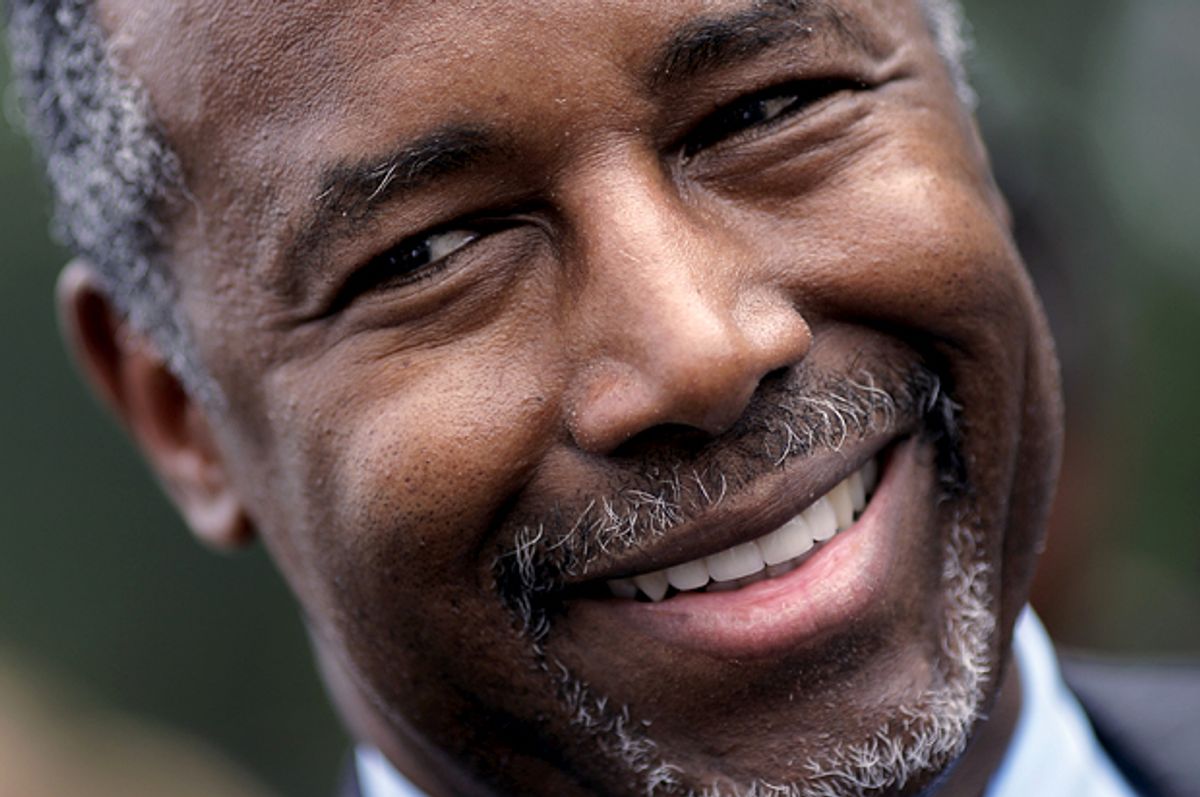In a primary season that has seen the most unlikely of candidates, Donald Trump, surge to the head of the GOP pack, perhaps the least surprising development is the ascendance of another political outsider: Dr. Ben Carson. But to understand why Carson's recent success in Republican polls makes so much sense, one must first take a closer look at the nature of the modern Republican Party.
In the Age of Obama, GOP elites routinely bloviate about their need to expand outreach to people of color, especially Hispanics and Latinos, given the United States’ changing ethnic and racial demographics. Yet, the Party has consistently failed to leverage opportunities to that end. This could be a function of incompetence. Alternatively, such a lack of substantive efforts could simply be a reflection of a political party that is dedicated to white racial resentment and white identity politics—and thus suppressing the votes of non-whites—as its primary electoral strategy.
Given these dynamics, how does one make sense of the curious case of Ben Carson? How then does his surging popularity compute?
Carson’s popularity points out the tension between what is known as “substantive” and “descriptive” politics. Substantive politics centers on a belief in a person’s values and policy positions as overriding other identity-based concerns about governance and political behavior. Yes, the body that an individual is born into matters. But, substantive politics presumes that almost any person can effectively represent a given constituency and its values. Descriptive politics, on the other hand, is the belief that a person’s life experiences and identity, especially if they are an outsider or Other in a given socio-political system -- in the United States and West this would be women, people of color, gays and lesbians, and members of other marginalized groups -- will lead them to challenge the system or be transformative and somehow resistant.
Ultimately, the tension here is between individuals and systems. Do our racialized, ethnic, gendered, and other identities provide gifted insight and leverage for those we represent in government? Or is it best to vote for and support candidates based on their ideas alone, with an understanding that the system exercises constraints on all actors?
(Stated differently: A white man may do a better job of representing his black and brown constituents’ interests than a brother or sister who “sells out” to Power. The latter is a “token”; the former can be a true and effective representative.)
White conservatives love Ben Carson, the black face in a high place, in a sea of white candidates, because his symbolic presence provides cover for the white supremacist politics endorsed by the post-civil rights era Republican Party.
Despite his popularity, Ben Carson is actually an example of the worst case of weak, symbolic, petty, token descriptive politics, where the fact of his presence as a black person is somehow supposed to win over non-white voters to the Republican Party, and demonstrate that the latter is “inclusive” and “not racist.”
Yet Ben Carson’s policy proposals are not significantly different from those of his 2016 Republican primary peers. He wants to end the Affordable Care Act, do the bidding of the National Rifle Association against the will of the American people, take away women’s reproductive choices, usher in an American theocracy, and prevent the plutocrats of the 1 percent from paying their fair share in taxes.
In many ways, Carson is actually worse than the white conservatives he shared the stage with at the debate the other night. He has repeatedly channeled ugly and grotesque anti-black sentiments and beliefs about the agency, freedom, and intelligence of the African-American community. This is his assigned role as a black conservative; his politics are no less noxious for his expertly performing the assigned script.
By contrast, Bernie Sanders and Hillary Clinton have done a far better job of responding to the concerns of black and brown Americans -- even though the 2016 Democratic presidential primary field does not include a person of color.
The Republican Party props up its black conservative human mascots and flavors of the month during the presidential campaign season because, on a basic level, white conservatives misunderstand non-white voters. People of color have rejected the Republican Party not only because of questions of representation, but also because its policies are anathema to the well-being, safety, security, and prosperity of Black and Brown America.
The Republican Party is facing demographic suicide in an America that is increasingly black and brown -- where the GOP’s policies have savaged the poor, working, and middle classes.
When a person is lost in the desert, they tend to walk in circles because they instinctively follow their dominant hand. He or she will eventually die from dehydration. The 2016 Republican presidential primary candidates are an example of a political organization in a death spiral. Black conservatives like Ben Carson will not save them. Together with his co-frontrunner Donald Trump, they are mirages that will lead the Republican Party to its doom.

Shares